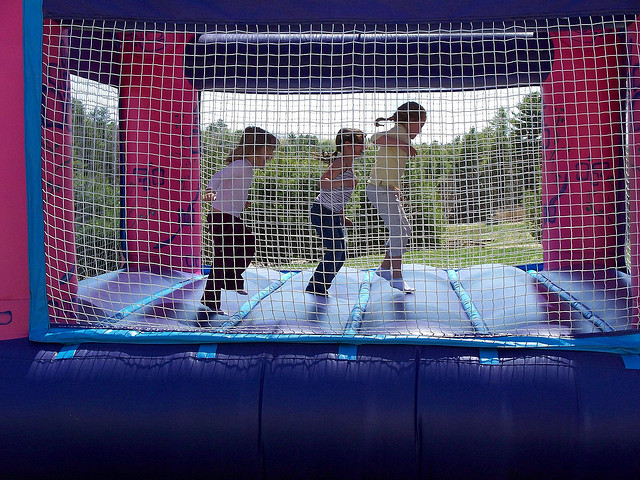Jumping jacks high on city budget agenda
By Alison Cuddy

Jumping jacks high on city budget agenda
By Alison Cuddy
WBEZ brings you fact-based news and information.
Sign up for our newsletters
to stay up to date on the stories that matter.

The Department of Cultural Affairs and Special Events (DCASE) has had a busy year. Under the leadership of Commissioner Michelle Boone, the department’s been reorganized, put out the city’s first cultural plan in 25 years, and overhauled long-standing festivals like the Taste of Chicago and Gospel Fest.
But when Boone and some members of her Cultural Affairs team made their presentation at Monday’s city budget hearings, many aldermen had something else on their mind: Jumping jacks.
Jumping jacks go by many names, including bouncy houses, moon walks or moon bounces. They’re those inflatable houses that kids, well, jump around in at most block and many back yard parties. Last year the Department handed the program off to a private contractor. That has some aldermen, like the 31st ward’s Ray Suarez, concerned.
Suarez asked a series of questions about the new program, including how many jumping jacks the City still owns (75 according to DCASE Chief of Staff David McDermott). At times his tone got a bit testy. McDermott claimed outsourcing had saved the department money, saying the city had spent about $250 per hour running the program while private contractors were managing it for around $70 per hour.
Suarez replied: “The private sector is out to make money. That’s not our mission. Our mission is to provide some service and some enjoyment to the children.”
Commissioner Boone underlined that the new service wasn’t just cheaper but better: “Block parties were only able to have access to the jack for one hour. With the new system, the jack is now on site for four hours.”
Alderman Walter Burnett of the 27th ward thanked Boone for “saving the program,” but also noted there were still some “kinks to be worked out.” And while committee chair Carrie Austin of the 34th ward commended Boone for “doing an outstanding job” she closed the meeting by reiterating that she wanted to know more about the new jumping jacks program, including “the numbers of savings as well as the costs in-house, so that we can transmit that to our constituency.”
All told, the discussion of jumping jacks took up about a quarter of the entire hour-long presentation. And though a block party amusement may seem like a trivial, side-bar matter, in the larger context the focus on them isn’t surprising. During this round of the hearings, aldermen asked cost-benefit type questions about any number of programs DCASE is running, from the newly re-vamped Taste of Chicago to the neighborhood festivals.
As with any other city department, as costs for services have gone up, they’re being passed on to residents, whether in the form of new ticketed seating and reserved events within the “free admission” Taste, or new fees for festival organizers (which until last November were waived). 43rd Ward Alderman Michelle Smith welcomed a possible “neighborhood festival association” (one of the initiatives in the new cultural plan) as a tool for keeping the number of festivals to a sustainable level. And outside council chambers, Alderman John Arena of the 45th ward said when it comes to festival fees, he wanted to be sure the money wouldn’t go into the general fund but back into cultural programming.
But according to an email from DCASE spokesperson Mary May, “DCASE does not collect the revenues generated” from neighborhood festivals. Instead they are “collected and deposited into the city departments permitting the events, such as the Department of Business Affairs, CDOT (Chicago Department of Transportation) or Department of Buildings.”
As for the cultural plan itself, after the meeting Commissioner Boone said the next step in the plan was another plan, for implementation. She estimated that should be made public within 100 days.